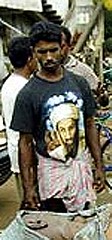Waves

The New York Times has published a number of photographs from the disaster areas that sweep the coasts of India, Sri Lanka and Thailand. We see people who are desperate for help, poking at solid mud, searching for the lost. We see beautiful women in colorful sarongs wailing at open mass graves. My heart feels their yearning for aid and comfort.
One horrific story told of how moments before the tsunami struck, the water drew back and rushed out to sea, leaving live fish slapping on the wet sand. Children ran down to fetch the unexpected bounty -- their last moments were spent grabbing at dancing, silvery fish with glee. Few survived.
In one photo from Sri Lanka, there are two men carrying away a twisted, half-naked body; people are standing around in a daze. One such bystander to this pathetic scene is a young, dark-haired Sri Lankan wearing a bin Laden t-shirt. I wonder if the editors of the New York Times inserted this image deliberately, or if it was overlooked, or deemed irrelevant to the commiserable scene.
I have nothing but sympathy for these poor blighted people. The anguish in their faces require no additional words of sorrow. Seeing the bin Laden bystander has me wondering if these people would have the same sympathy for my countrymen, under reversed fate. I wonder if a handful of American aid dollars might get him to discard his tattered bin Laden shirt -- or merely buy a new one. I wonder if he thinks the Arab League should be sending him aid instead of infidel Americans. It’s disheartening that this man should tinge my sympathy with cynicism. But there it is.
Living consists of enduring tsunamis -- unexpected waves rising out of the sea, changing everything. If asked only a minute before the first wave hit, “what threatens you the most,” the bin Laden bystander might have postulated that George Bush was his greatest threat, or American capitalism. Or perhaps he would have lamented diminishing fish supplies, or pointed at a deforested tropical coastland. Maybe he would have expressed fear for Tamil rebels, or government army men. Then, only one minute later, the sea’s horizon would tilt upwards, sweeping away the expected.
Change tends to come in waves -- deep, silent swells that knock every atom of presumption aside, overturning accepted prejudices, ideas, fears and dreams. 9/11 was one such wave. It was a great surge that overcame our meticulously constructed reality, seemingly impervious to the dark motives of bearded men living in 12th century Afghanistan. That wave rose out of the sea, on a beautiful, sunny day. And a new world was born in its wake.
In this last nod to 2004, we should remember waves. We can look back on human history and see that fundamental change rises from nowhere, and is revolutionary. Waves like the 1918 Influenza Pandemic, or the 1929 Crash; waves such as Pearl Harbor and Trinity, or a crumbling Berlin Wall, or the World Wide Web. In retrospect, there were impending signs, and surely their coming could have been foretold if anyone was attuned and heard. We should recognize that our greatest asset as living beings is our capacity to absorb waves. In so doing, we transform ourselves, and move ahead. The waves of this world make us a better people. We will endure only if we create opportunity from the abrupt realities that rise from the sea.

<< Home